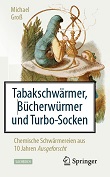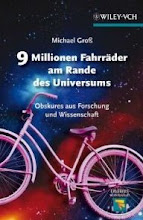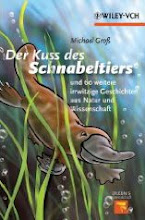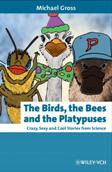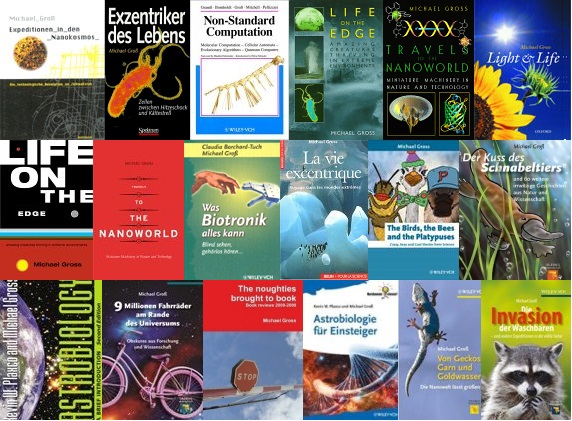Today's selection of science news. Links are normally to press releases on EurekAlert (at the bottom end I may also add a couple of newspaper stories). I include quotes from the summary (using quotation marks) in cases where the title alone doesn't reveal what the story is about. My own thoughts appear without quotation marks, if I have any.
conservation
How protected areas are losing ground in the United States and Amazonia
"Once champions of global conservation, the United States and Brazil are now leading a troubling global trend of large-scale rollbacks in environmental policy, putting hundreds of protected areas at risk, a new study suggests."
humans
Ancient DNA tells the story of the first herders and farmers in east Africa
UCI research helps shed new light on circadian clocks
"Can your liver sense when you're staring at a television screen or cellphone late at night? Apparently so, and when such activity is detected, the organ can throw your circadian rhythms out of whack, leaving you more susceptible to health problems."
Circadian clock and fat metabolism linked through newly discovered mechanism
Eating blueberries every day improves heart health
sustainability
Edible insects? Lab-grown meat? The real future food is lab-grown insect meat
Swapping water for CO2 could make fracking greener and more effective
"Scientists at the Chinese Academy of Sciences and China University of Petroleum (Beijing) have demonstrated that CO2 may make a better hydraulic fracturing (fracking) fluid than water. Their research, published May 30 in the journal Joule, could help pave the way for a more eco-friendly form of fracking that would double as a mechanism for storing captured atmospheric CO2."
Friday, May 31, 2019
Thursday, May 30, 2019
science news 30.5.2019
Today's selection of science news. Links are normally to press releases on EurekAlert (at the bottom end I may also add a couple of newspaper stories). I include quotes from the summary (using quotation marks) in cases where the title alone doesn't reveal what the story is about. My own thoughts appear without quotation marks, if I have any.
astrobiology
'Fettuccine' may be most obvious sign of life on Mars, researchers report
"A rover scanning the surface of Mars for evidence of life might want to check for rocks that look like pasta, researchers report in the journal Astrobiology. The bacterium that controls the formation of such rocks on Earth is ancient and thrives in harsh environments that are similar to conditions on Mars, said University of Illinois geology professor Bruce Fouke, who led the new, NASA-funded study."
ecology
Chimps caught crabbing
humans
Declining fertility rates may explain Neanderthal extinction, suggests new model
Early humans deliberately recycled flint to create tiny, sharp tools
Humans used northern migration routes to reach eastern Asia
astrobiology
'Fettuccine' may be most obvious sign of life on Mars, researchers report
"A rover scanning the surface of Mars for evidence of life might want to check for rocks that look like pasta, researchers report in the journal Astrobiology. The bacterium that controls the formation of such rocks on Earth is ancient and thrives in harsh environments that are similar to conditions on Mars, said University of Illinois geology professor Bruce Fouke, who led the new, NASA-funded study."
ecology
Chimps caught crabbing
humans
Declining fertility rates may explain Neanderthal extinction, suggests new model
Early humans deliberately recycled flint to create tiny, sharp tools
Humans used northern migration routes to reach eastern Asia
Wednesday, May 29, 2019
science news 29.5.2019
Today's selection of science news. Links are normally to press releases on EurekAlert (at the bottom end I may also add a couple of newspaper stories). I include quotes from the summary (using quotation marks) in cases where the title alone doesn't reveal what the story is about. My own thoughts appear without quotation marks, if I have any.
astrobiology
The 'Forbidden' planet has been found in the 'Neptunian Desert'
evolution
All ears: Genetic bases of mammalian inner ear evolution
ecology
Fossil zooplankton indicate that marine ecosystems have entered the Anthropocene
Africa's elephant poaching rates in decline, but iconic animal still under threat
Peak poaching was in 2011, apparently
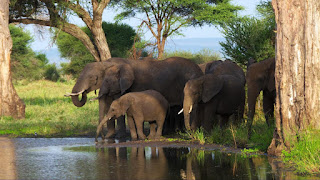
Despite the decline in poaching, Africa's elephants are still at risk.
Credit: Colin Beale, University of York
astrobiology
The 'Forbidden' planet has been found in the 'Neptunian Desert'
evolution
All ears: Genetic bases of mammalian inner ear evolution
ecology
Fossil zooplankton indicate that marine ecosystems have entered the Anthropocene
Africa's elephant poaching rates in decline, but iconic animal still under threat
Peak poaching was in 2011, apparently

Despite the decline in poaching, Africa's elephants are still at risk.
Credit: Colin Beale, University of York
Tuesday, May 28, 2019
science news 28.5.2019
Today's selection of science news. Links are normally to press releases on EurekAlert (at the bottom end I may also add a couple of newspaper stories). I include quotes from the summary (using quotation marks) in cases where the title alone doesn't reveal what the story is about. My own thoughts appear without quotation marks, if I have any.
environment
Antibiotics found in some of the world's rivers exceed 'safe' levels, global study finds
food and drink
Exploring the origins of the apple
Recent archaeological finds of ancient preserved apple seeds across Europe and West Asia combined with historical, paleontological, and recently published genetic data are presenting a fascinating new narrative for one of our most familiar fruits. The apple was originally spread by ancient megafauna and later as a process of trade along the Silk Road. When previously separated varieties came into contact, hybridization and grafting allowed for the development of the varieties that we know today.

The wild apples in the Tien Shan Mountains represent the main ancestral population for our modern apple. These trees produce large fruits, which are often red when ripe and have a varying array of flavors. These were the ancestors of the trees that people first started to cultivate and spread along the Silk Road.
Credit: Prof. Dr. Martin R. Stuchtey
humans
Scientists uncover a trove of genes that could hold key to how humans evolved
"New computational analysis finds that more than two dozen human zinc finger transcription factors, previously thought to control activity of similar genes across species have in fact human-specific roles and could help explain how our species came to be."
How language developed: Comprehension learning precedes vocal production
Specifically, monkeys learned to recognise drone noises, but failed to create a new "word" for them.
New causes of autism found in 'junk' DNA
-------------
From the news media
50 years after Apollo 11, another race to the Moon ...
environment
Antibiotics found in some of the world's rivers exceed 'safe' levels, global study finds
food and drink
Exploring the origins of the apple
Recent archaeological finds of ancient preserved apple seeds across Europe and West Asia combined with historical, paleontological, and recently published genetic data are presenting a fascinating new narrative for one of our most familiar fruits. The apple was originally spread by ancient megafauna and later as a process of trade along the Silk Road. When previously separated varieties came into contact, hybridization and grafting allowed for the development of the varieties that we know today.

The wild apples in the Tien Shan Mountains represent the main ancestral population for our modern apple. These trees produce large fruits, which are often red when ripe and have a varying array of flavors. These were the ancestors of the trees that people first started to cultivate and spread along the Silk Road.
Credit: Prof. Dr. Martin R. Stuchtey
humans
Scientists uncover a trove of genes that could hold key to how humans evolved
"New computational analysis finds that more than two dozen human zinc finger transcription factors, previously thought to control activity of similar genes across species have in fact human-specific roles and could help explain how our species came to be."
How language developed: Comprehension learning precedes vocal production
Specifically, monkeys learned to recognise drone noises, but failed to create a new "word" for them.
New causes of autism found in 'junk' DNA
-------------
From the news media
50 years after Apollo 11, another race to the Moon ...
Monday, May 27, 2019
punk turtles forever
Open Archive Day
With this feature published a year ago I blatantly rode the wave of publicity created by the images of the punk turtle (real name: Mary River turtle, Elusor macrurus), which was one of the species highlighted in the first EDGE (Evolutionary Distinctiveness / General Endangerment) ranking of reptiles. I'm very grateful though that I discovered the EDGE rankings via the punk turtle. I have since revisited the lists for mammals and generally find them very useful when it comes to figuring out where the real problems are in ecology and conservation.
So one year on, the feature on the reptiles list is now in the open archives:
Reptiles on the Edge
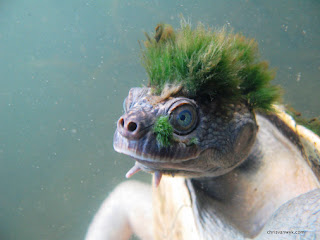
The Mary River turtle (Elusor macrurus) became a media sensation after the publication of the EDGE ranking for reptiles. Dubbed the ‘punk turtle’, the species sports green hair consisting of algae. The protrusions under its chin are sensors for exploring in muddy waters. (Image: © Chris Van Wyk.)
With this feature published a year ago I blatantly rode the wave of publicity created by the images of the punk turtle (real name: Mary River turtle, Elusor macrurus), which was one of the species highlighted in the first EDGE (Evolutionary Distinctiveness / General Endangerment) ranking of reptiles. I'm very grateful though that I discovered the EDGE rankings via the punk turtle. I have since revisited the lists for mammals and generally find them very useful when it comes to figuring out where the real problems are in ecology and conservation.
So one year on, the feature on the reptiles list is now in the open archives:
Reptiles on the Edge

The Mary River turtle (Elusor macrurus) became a media sensation after the publication of the EDGE ranking for reptiles. Dubbed the ‘punk turtle’, the species sports green hair consisting of algae. The protrusions under its chin are sensors for exploring in muddy waters. (Image: © Chris Van Wyk.)
Sunday, May 26, 2019
next generation
All our instruments series, episode 12
After the instruments that already accompanied my misspent youth, we're proceeding in the chronological order to those acquired for the benefit of our children. The first of which is a lovely xylophone dating from 1992. But you can still get essentially the same model from the maker Sonor, which is another company from East Germany (Weißenfels an der Saale ) that moved westwards to Aue in Westphalia after 1945 (history is here).
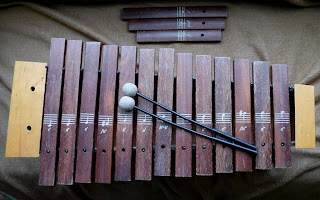
The instrument counts as an alto and covers the C major scale from c1 to a2, and we have a Bb and both F# sticks for key changes. It has miraculously survived a sequence of three toddlers climbing over it and ripping off the sound bars, so I can recommend it to any young family.
In the video I've had a go at O du lieber Augustin - a tune we played at a session just this week, and upon looking it up I learned that the original Viennese song is about a bagpiper in Vienna during the Plague, who was thrown into a mass grave by mistake and survived thanks to playing his bagpipes - quite a story. Although the song is standard nursery rhyme fare in Germany, I had never heard the story behind it. I am told the English folk tradition links the tune to the words (strangely rhyming with the Augustin lyrics): You can't put your muck in our dustbin ...
And the second tune is Ganivelle, which we play at the French session.
After the instruments that already accompanied my misspent youth, we're proceeding in the chronological order to those acquired for the benefit of our children. The first of which is a lovely xylophone dating from 1992. But you can still get essentially the same model from the maker Sonor, which is another company from East Germany (Weißenfels an der Saale ) that moved westwards to Aue in Westphalia after 1945 (history is here).
The instrument counts as an alto and covers the C major scale from c1 to a2, and we have a Bb and both F# sticks for key changes. It has miraculously survived a sequence of three toddlers climbing over it and ripping off the sound bars, so I can recommend it to any young family.
In the video I've had a go at O du lieber Augustin - a tune we played at a session just this week, and upon looking it up I learned that the original Viennese song is about a bagpiper in Vienna during the Plague, who was thrown into a mass grave by mistake and survived thanks to playing his bagpipes - quite a story. Although the song is standard nursery rhyme fare in Germany, I had never heard the story behind it. I am told the English folk tradition links the tune to the words (strangely rhyming with the Augustin lyrics): You can't put your muck in our dustbin ...
And the second tune is Ganivelle, which we play at the French session.
Saturday, May 25, 2019
lavinia
review of
Lavinia
by Ursula Le Guin
There is currently a trend of revisiting the ancient Greek legends from a female perspective, with books like Circe by Madeline Miller, A thousand ships by Natalie Haynes, and The silence of the girls by Pat Barker getting much attention.
Lavinia by Ursula Le Guin (1929-2018) came ahead of the wave, published in 2008. After catching up with the Aeneid in her 70s, remembering her frustration that she missed out on it at school, Le Guin gave flesh and blood to the woman Aeneas marries after his arrival in Italy, joining the dots that Vergil left unattended.
I do love novels that fill in the gaps in the official history or legend by recreating neglected voices (see also The Moor’s account, and Robert Harris’s Cicero trilogy), and this is a fine example to add to this collection. Even if we’re not exactly on firm historical ground here, as there are several centuries between the Trojan War and the foundation of Rome, which Vergil tried to connect with the figure of Aeneas.
Le Guin’s Lavinia, daughter of King Latinus of Latium, is a very sane and engaging human – a refreshing antidote to all the mad slaughter going on in the ancient legends. She is aware that she isn’t real in a strict historical sense, but only brought to life by the poet, i.e. Vergil, who also makes a shadowy appearance. This slightly surreal element is handled with subtlety though and thus didn’t bother me too much.
Another plus of these books is that they offer a chance to brush up the classics without too much of the gore and testosterone overload of the original texts. If I find the time I might carry on the Trojan trail with Circe and/or Natalie Haynes’ new work.
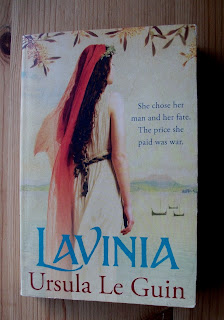
My Lavinia, discovered at the antiques fair last summer. I do love the cover as well as the content.
Lavinia
by Ursula Le Guin
There is currently a trend of revisiting the ancient Greek legends from a female perspective, with books like Circe by Madeline Miller, A thousand ships by Natalie Haynes, and The silence of the girls by Pat Barker getting much attention.
Lavinia by Ursula Le Guin (1929-2018) came ahead of the wave, published in 2008. After catching up with the Aeneid in her 70s, remembering her frustration that she missed out on it at school, Le Guin gave flesh and blood to the woman Aeneas marries after his arrival in Italy, joining the dots that Vergil left unattended.
I do love novels that fill in the gaps in the official history or legend by recreating neglected voices (see also The Moor’s account, and Robert Harris’s Cicero trilogy), and this is a fine example to add to this collection. Even if we’re not exactly on firm historical ground here, as there are several centuries between the Trojan War and the foundation of Rome, which Vergil tried to connect with the figure of Aeneas.
Le Guin’s Lavinia, daughter of King Latinus of Latium, is a very sane and engaging human – a refreshing antidote to all the mad slaughter going on in the ancient legends. She is aware that she isn’t real in a strict historical sense, but only brought to life by the poet, i.e. Vergil, who also makes a shadowy appearance. This slightly surreal element is handled with subtlety though and thus didn’t bother me too much.
Another plus of these books is that they offer a chance to brush up the classics without too much of the gore and testosterone overload of the original texts. If I find the time I might carry on the Trojan trail with Circe and/or Natalie Haynes’ new work.
My Lavinia, discovered at the antiques fair last summer. I do love the cover as well as the content.
Friday, May 24, 2019
science news 24.5.2019
Today's selection of science news. Links are normally to press releases on EurekAlert (at the bottom end I may also add a couple of newspaper stories). I include quotes from the summary (using quotation marks) in cases where the title alone doesn't reveal what the story is about. My own thoughts appear without quotation marks, if I have any.
astrobiology
On Mars, sands shift to a different drum
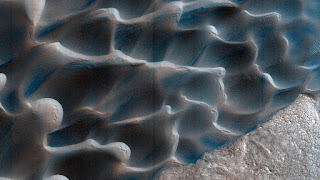
The retreat of Mars' polar cap of frozen carbon dioxide during the spring and summer generates winds that drive the largest movements of sand dunes observed on the red planet.
Credit: NASA/JPL/University of Arizona/USGS)
ecology
Wolf-dog 'swarms' threaten Europe's wolves
the birds and the bees
These fruit bats trade food for sex
Older male crickets attract more females -- but have less sex
climate change
Widespread permafrost degradation seen in high Arctic terrain
Melting small glaciers could add 10 inches to sea levels
2D materials
Plumbene, graphene's latest cousin, realized on the 'nano water cube'
New flatland material: Physicists obtain quasi-2D gold
humans
What we think we know -- but might not -- pushes us to learn more
Phase transitions: The math behind the music
"Physics Professor Jesse Berezovsky contends that until now, much of the thinking about math and music has been a top-down approach, applying mathematical ideas to existing musical compositions as a way of understanding already existing music. He contends he's uncovering the 'emergent structures of musical harmony' inherent in the art, just as order comes from disorder in the physical world. He believes that could mean a whole new way of looking at music of the past, present and future."
I'm loving the tone of this summary implying that the press officer doesn't believe any of it.
astrobiology
On Mars, sands shift to a different drum

The retreat of Mars' polar cap of frozen carbon dioxide during the spring and summer generates winds that drive the largest movements of sand dunes observed on the red planet.
Credit: NASA/JPL/University of Arizona/USGS)
ecology
Wolf-dog 'swarms' threaten Europe's wolves
the birds and the bees
These fruit bats trade food for sex
Older male crickets attract more females -- but have less sex
climate change
Widespread permafrost degradation seen in high Arctic terrain
Melting small glaciers could add 10 inches to sea levels
2D materials
Plumbene, graphene's latest cousin, realized on the 'nano water cube'
New flatland material: Physicists obtain quasi-2D gold
humans
What we think we know -- but might not -- pushes us to learn more
Phase transitions: The math behind the music
"Physics Professor Jesse Berezovsky contends that until now, much of the thinking about math and music has been a top-down approach, applying mathematical ideas to existing musical compositions as a way of understanding already existing music. He contends he's uncovering the 'emergent structures of musical harmony' inherent in the art, just as order comes from disorder in the physical world. He believes that could mean a whole new way of looking at music of the past, present and future."
I'm loving the tone of this summary implying that the press officer doesn't believe any of it.
Thursday, May 23, 2019
science news 23.5.2019
Today's selection of science news. Links are normally to press releases on EurekAlert (at the bottom end I may also add a couple of newspaper stories). I include quotes from the summary (using quotation marks) in cases where the title alone doesn't reveal what the story is about. My own thoughts appear without quotation marks, if I have any.
astrobiology
18 Earth-sized exoplanets discovered
Detecting bacteria in space
"A new genomic approach provides a glimpse into the diverse bacterial ecosystem on the International Space Station."
conservation
Chimpanzees at the crossroads: Adapt to living outside protected areas
bio-inspired
Octopus-inspired wearable sensor
inspired by the suckers' adhesion though, not involving 8 arms, sadly.
sustainable tech
Ancient toy inspires tool for state-of-the-art science
spoiler alert: a spinning-toy inspired an off-grid centrifuge for under $1.

A sample vial is placed into the disk of a 3D-Fuge for separation.
Credit: Rob Felt, Georgia Tech
food and drink
Cocktails with Cleopatra?
"A team of scientists [...] create ancient alcohol from ancient yeast."
astrobiology
18 Earth-sized exoplanets discovered
Detecting bacteria in space
"A new genomic approach provides a glimpse into the diverse bacterial ecosystem on the International Space Station."
conservation
Chimpanzees at the crossroads: Adapt to living outside protected areas
bio-inspired
Octopus-inspired wearable sensor
inspired by the suckers' adhesion though, not involving 8 arms, sadly.
sustainable tech
Ancient toy inspires tool for state-of-the-art science
spoiler alert: a spinning-toy inspired an off-grid centrifuge for under $1.

A sample vial is placed into the disk of a 3D-Fuge for separation.
Credit: Rob Felt, Georgia Tech
food and drink
Cocktails with Cleopatra?
"A team of scientists [...] create ancient alcohol from ancient yeast."
Wednesday, May 22, 2019
science news 22.5.2019
Today's selection of science news. Links are normally to press releases on EurekAlert (at the bottom end I may also add a couple of newspaper stories). I include quotes from the summary (using quotation marks) in cases where the title alone doesn't reveal what the story is about. My own thoughts appear without quotation marks, if I have any.
astrobiology
Ammonium fertilized early life on earth
evolution
In a first, researchers identify reddish coloring in an ancient fossil
"Researchers have for the first time detected chemical traces of red pigment in an ancient fossil -- an exceptionally well-preserved mouse, not unlike today's field mice, that roamed the fields of what is now the German village of Willershausen around 3 million years ago."
ecology
Fish fences across the tropical seas having large-scale devastating effects
Baby tiger sharks eat songbirds
Eastern forests shaped more by Native Americans' burning than climate change
"Native Americans' use of fire to manage vegetation in what is now the Eastern United States was more profound than previously believed, according to a Penn State researcher who determined that forest composition change in the region was caused more by land use than climate change."
climate change
Scientists discovered an entirely new reason for methane venting from the Arctic Shelf
humans
Testifying while black: A linguistic analysis of disparities in court transcription
River valleys helped shape current genetic landscape of Han Chinese
"The Han Chinese are the world's largest ethnic group, making up 91.6% of modern-day China. Now, in a new study drawing from the largest study to date of three generations of 21,668, unrelated Han Chinese DNA samples, spread out over all provinces, lead author Qing-Peng Kong and his team, of the Kunming Institute of Zoology have shown the importance of how the three main river valleys in China contributed to Han genetic diversity."
Difficulties with reading and narration in children with autism
"Children with autism may be good at reading a text one word at a time, but simultaneously have problems in understanding and retelling the content of what they read. Research now shows the importance, for these children, of extensive language assessment and follow-up over time."
measures
Original kilogram replaced -- new International System of Units (SI) entered into force

Prototype of a silicon-28 single crystal after growth in a floating zone plant in the context of the KILOGRAM project.
Credit: IKZ
maths
Mathematicians revive abandoned approach to Riemann Hypothesis
"The hypothesis is a vehicle to understand one of the greatest mysteries in number theory -- the pattern underlying prime numbers."
Tuesday, May 21, 2019
science news 21.5.2019
Today's selection of science news. Links are normally to press releases on EurekAlert (at the bottom end I may also add a couple of newspaper stories). I include quotes from the summary (using quotation marks) in cases where the title alone doesn't reveal what the story is about. My own thoughts appear without quotation marks, if I have any.
earth
How Earth's mantle is like a Jackson Pollock painting
"To geologists, the mantle is so much more than that. It's a region that lives somewhere between the cold of the crust and the bright heat of the core. It's where the ocean floor is born and where tectonic plates die. A new paper published today in Nature Geoscience paints an even more intricate picture of the mantle as a geochemically diverse mosaic, far different than the relatively uniform lavas that eventually reach the surface."
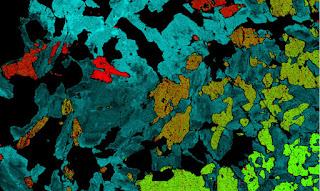
behaviour
Bonobo mothers help their sons to have more offspring
Intriguing, and a bit scary if extrapolated to humans.
sustainability
Cement as a climate killer: Using industrial waste to produce carbon neutral alternatives
But haven't we been promised that before ?
------------------------
From the news media
Rewilding one quarter of the UK, suggested in the Guardian.
earth
How Earth's mantle is like a Jackson Pollock painting
"To geologists, the mantle is so much more than that. It's a region that lives somewhere between the cold of the crust and the bright heat of the core. It's where the ocean floor is born and where tectonic plates die. A new paper published today in Nature Geoscience paints an even more intricate picture of the mantle as a geochemically diverse mosaic, far different than the relatively uniform lavas that eventually reach the surface."

behaviour
Bonobo mothers help their sons to have more offspring
Intriguing, and a bit scary if extrapolated to humans.
sustainability
Cement as a climate killer: Using industrial waste to produce carbon neutral alternatives
But haven't we been promised that before ?
------------------------
From the news media
Rewilding one quarter of the UK, suggested in the Guardian.
Monday, May 20, 2019
why birds are so different
Birds can fly, swim, sing, speak, use tools and save problems, navigate halfway around the globe, and do many other amazing and surprising things. And they made it through the last mass extinction, while their larger fellow dinosaurs were wiped out. Reason enough to have a think about how they came to be so colourful, clever and/or weird, which I'm doing in my latest feature which is out now:
How birds evolved to be different
Current Biology Volume 29, issue 10, pages R341-R344, May 20, 2019
FREE access to full text and PDF download

Black-collared Starling (Gracupica nigricollis), Long Valley, Hong Kong - Photo by Daniel J. Field, University of Cambridge.
How birds evolved to be different
Current Biology Volume 29, issue 10, pages R341-R344, May 20, 2019
FREE access to full text and PDF download

Black-collared Starling (Gracupica nigricollis), Long Valley, Hong Kong - Photo by Daniel J. Field, University of Cambridge.
Sunday, May 19, 2019
funny noises
All our instruments series, episode 11
After taking care of that old piano, we're now returning to the established principle of this series, introducing instruments by order of appearance.
Every once in a while there is one that I never quite got the hang of - even if I've had it for decades. Like the banjo, the Jew's harp is one I find ok for making ploinky noises, but it doesn't really work for me as an instrument. This just as a warning before you click the video.
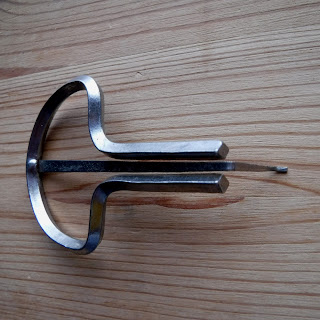
Here goes - if you can do any better, feel free to tell me what I'm doing wrong:
After taking care of that old piano, we're now returning to the established principle of this series, introducing instruments by order of appearance.
Every once in a while there is one that I never quite got the hang of - even if I've had it for decades. Like the banjo, the Jew's harp is one I find ok for making ploinky noises, but it doesn't really work for me as an instrument. This just as a warning before you click the video.
Here goes - if you can do any better, feel free to tell me what I'm doing wrong:
Saturday, May 18, 2019
In the midst of winter
Más allá del invierno
Isabel Allende
I think I first read Isabel Allende in 1984, when her first novel, La casa de los espiritus came out in translation and was very successful worldwide. From the next novel De amor y de sombras onwards, I read almost all her novels in the original version (a quick count gets me to 15). I skipped the young adult ones and may have missed one or two in recent years. (I really hated the cover of El cuaderno de Maya so much I couldn’t buy or read that one. Would have to wrap it in paper or something.)
Having started the shared reader/author journey 35 years ago with what was then the recent history of the coup in Chile, and having made all sorts of excursions to remote times such as the early days of the European conquest of the Americas, it feels a bit weird to be jolted into the present day New York and the eve of the Drumpf election with this novel published in 2017. However, it mostly works well.
It starts a bit slowly with a wintry encounter between the three very different characters, but then she throws in a dead body hidden in the trunk of a car and all goes swimmingly. Three interesting back stories relating to different parts of Latin America interwoven with the quest to do something meaningful about the body makes an interesting tapestry. Although the characters manage to sort out their mess, this doesn’t really tell us what to do about the rest of the horrid world.
PS looking for the cover of this one, I found out that the next novel is due out on May 21, called Largo pétalo de mar. I really do need to pull my socks up and keep up a bit better.
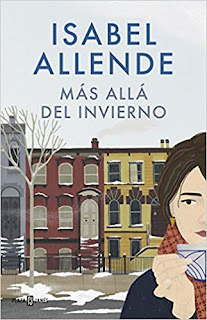
Isabel Allende
I think I first read Isabel Allende in 1984, when her first novel, La casa de los espiritus came out in translation and was very successful worldwide. From the next novel De amor y de sombras onwards, I read almost all her novels in the original version (a quick count gets me to 15). I skipped the young adult ones and may have missed one or two in recent years. (I really hated the cover of El cuaderno de Maya so much I couldn’t buy or read that one. Would have to wrap it in paper or something.)
Having started the shared reader/author journey 35 years ago with what was then the recent history of the coup in Chile, and having made all sorts of excursions to remote times such as the early days of the European conquest of the Americas, it feels a bit weird to be jolted into the present day New York and the eve of the Drumpf election with this novel published in 2017. However, it mostly works well.
It starts a bit slowly with a wintry encounter between the three very different characters, but then she throws in a dead body hidden in the trunk of a car and all goes swimmingly. Three interesting back stories relating to different parts of Latin America interwoven with the quest to do something meaningful about the body makes an interesting tapestry. Although the characters manage to sort out their mess, this doesn’t really tell us what to do about the rest of the horrid world.
PS looking for the cover of this one, I found out that the next novel is due out on May 21, called Largo pétalo de mar. I really do need to pull my socks up and keep up a bit better.

Friday, May 17, 2019
science news 17.5.2019
Today's selection of science news. Links are normally to press releases on EurekAlert (at the bottom end I may also add a couple of newspaper stories). I include quotes from the summary (using quotation marks) in cases where the title alone doesn't reveal what the story is about. My own thoughts appear without quotation marks, if I have any.
astrobiology
Galaxy blazes with new stars born from close encounter
"The irregular galaxy NGC 4485 shows all the signs of having been involved in a hit-and-run accident with a bypassing galaxy. Rather than destroying the galaxy, the chance encounter is spawning a new generation of stars, and presumably planets."
climate change
24% of West Antarctic ice is now unstable
Warming climate threatens microbes in alpine streams, new research shows
ecology
Bedbugs evolved more than 100 million years ago -- and walked the earth with T. rex
The global invasion routes of the red swamp crayfish, described based on genetics
conservation
Meet the tenrecs
"Researchers reviewed the conservation priorities for the 31 species of tenrec -- a poorly understood family of small mammals superficially resembling hedgehogs, found only on the island of Madagascar."
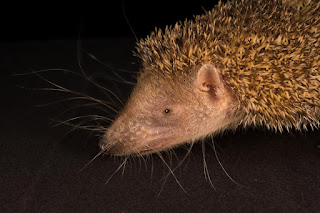
Researchers reviewed the conservation priorities for the 31 species of tenrec -- a poorly understood family of small mammals superficially resembling hedgehogs, found only on the island of Madagascar.
Credit: Julie Larsen Maher/WCS
light and life
Research suggests revision to common view on how retinal cells in mammals process light
As far as I understood, this is because previous view was based on amphibians and mammals use fewer G proteins per photon coming in.
medicine
Antibody responses vs. Ebola keep evolving in survivors, months after recovery
humans
How our current thinking can sway our memories of love
People recycle more when they know what recyclable waste becomes
astrobiology
Galaxy blazes with new stars born from close encounter
"The irregular galaxy NGC 4485 shows all the signs of having been involved in a hit-and-run accident with a bypassing galaxy. Rather than destroying the galaxy, the chance encounter is spawning a new generation of stars, and presumably planets."
climate change
24% of West Antarctic ice is now unstable
Warming climate threatens microbes in alpine streams, new research shows
ecology
Bedbugs evolved more than 100 million years ago -- and walked the earth with T. rex
The global invasion routes of the red swamp crayfish, described based on genetics
conservation
Meet the tenrecs
"Researchers reviewed the conservation priorities for the 31 species of tenrec -- a poorly understood family of small mammals superficially resembling hedgehogs, found only on the island of Madagascar."

Researchers reviewed the conservation priorities for the 31 species of tenrec -- a poorly understood family of small mammals superficially resembling hedgehogs, found only on the island of Madagascar.
Credit: Julie Larsen Maher/WCS
light and life
Research suggests revision to common view on how retinal cells in mammals process light
As far as I understood, this is because previous view was based on amphibians and mammals use fewer G proteins per photon coming in.
medicine
Antibody responses vs. Ebola keep evolving in survivors, months after recovery
humans
How our current thinking can sway our memories of love
People recycle more when they know what recyclable waste becomes
Thursday, May 16, 2019
science news 16.5.2019
Today's selection of science news. Links are normally to press releases on EurekAlert (at the bottom end I may also add a couple of newspaper stories). I include quotes from the summary (using quotation marks) in cases where the title alone doesn't reveal what the story is about. My own thoughts appear without quotation marks, if I have any.
environment and sustainability
New whistle alerts bats to steer clear of wind turbines
Can sound protect eagles from wind turbine collisions?
When biodegradable plastic isn't
"Manufacturers offer biodegradable or compostable plastic bags, but in many cases, these claims have not been tested in natural environments. Now, researchers report in ACS' Environmental Science & Technology that the bags do not degrade in some environments any faster than regular polyethylene."
humans
Ancient fish ponds in the Bolivian savanna supported human settlement
Scientists suss out the secrets of human screams
"Screaming is well-studied in animals, but much less is known about how human screams function in communication, or how similar or different human screams are from those of other species. To help unlock the secrets of human screaming, researchers at Emory University have studied human vocal sounds, representing a broad acoustical range and array of emotional contexts, and studied what makes a sound a scream or not."
Shoutout to the Acoustics Society of America, they always have the most fascinating press releases when their annual meeting is on.
Also, this reminds me of the 1990s News and Views piece in Nature by Jared Diamond about why people scream when attacked - give or take a few duplicated letters, the title was Aaaaaarrrrrrgh, nooo! I found that quite inspiring in terms of what you can get away with in a scientific journal.
Chewing gums reveal the oldest Scandinavian human DNA
"The first humans who settled in Scandinavia more than 10,000 years ago left their DNA behind in ancient chewing gums, which are masticated lumps made from birch bark pitch."
languages
Bristol academic cracks Voynich code, solving century-old mystery of medieval text
According to a new analyisis, it is written in proto-Romance and there are 200 pages left to be translated. Oh and it is the only known document written in proto-Romance.
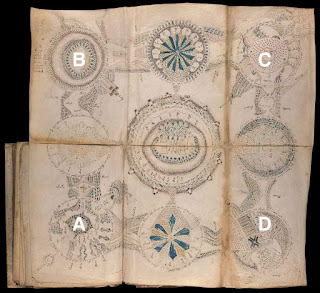
Vignette A illustrates the erupting volcano that prompted the rescue mission and the drawing of the map. It rose from the seabed to create a new island given the name Vulcanello, which later became joined to the island of Vulcano following another eruption in 1550. Vignette B depicts the volcano of Ischia, vignette C shows the islet of Castello Aragonese, and vignette D represents the island of Lipari. Each vignette includes a combination of naïvely drawn and somewhat stylized images along with annotations to explain and add detail. The other five vignettes describe further details of the story.
Credit: Voynich manuscript
------------------
from the news media:
Just as I got really excited about the Voynich manuscript and the proto-Romance language, I found this piece in the Guardian, which quotes several experts who don't believe the claims. So, wait and see - would be amazing though.
environment and sustainability
New whistle alerts bats to steer clear of wind turbines
Can sound protect eagles from wind turbine collisions?
When biodegradable plastic isn't
"Manufacturers offer biodegradable or compostable plastic bags, but in many cases, these claims have not been tested in natural environments. Now, researchers report in ACS' Environmental Science & Technology that the bags do not degrade in some environments any faster than regular polyethylene."
humans
Ancient fish ponds in the Bolivian savanna supported human settlement
Scientists suss out the secrets of human screams
"Screaming is well-studied in animals, but much less is known about how human screams function in communication, or how similar or different human screams are from those of other species. To help unlock the secrets of human screaming, researchers at Emory University have studied human vocal sounds, representing a broad acoustical range and array of emotional contexts, and studied what makes a sound a scream or not."
Shoutout to the Acoustics Society of America, they always have the most fascinating press releases when their annual meeting is on.
Also, this reminds me of the 1990s News and Views piece in Nature by Jared Diamond about why people scream when attacked - give or take a few duplicated letters, the title was Aaaaaarrrrrrgh, nooo! I found that quite inspiring in terms of what you can get away with in a scientific journal.
Chewing gums reveal the oldest Scandinavian human DNA
"The first humans who settled in Scandinavia more than 10,000 years ago left their DNA behind in ancient chewing gums, which are masticated lumps made from birch bark pitch."
languages
Bristol academic cracks Voynich code, solving century-old mystery of medieval text
According to a new analyisis, it is written in proto-Romance and there are 200 pages left to be translated. Oh and it is the only known document written in proto-Romance.

Vignette A illustrates the erupting volcano that prompted the rescue mission and the drawing of the map. It rose from the seabed to create a new island given the name Vulcanello, which later became joined to the island of Vulcano following another eruption in 1550. Vignette B depicts the volcano of Ischia, vignette C shows the islet of Castello Aragonese, and vignette D represents the island of Lipari. Each vignette includes a combination of naïvely drawn and somewhat stylized images along with annotations to explain and add detail. The other five vignettes describe further details of the story.
Credit: Voynich manuscript
------------------
from the news media:
Just as I got really excited about the Voynich manuscript and the proto-Romance language, I found this piece in the Guardian, which quotes several experts who don't believe the claims. So, wait and see - would be amazing though.
Wednesday, May 15, 2019
science news 15.5.2019
Today's selection of science news. Links are normally to press releases on EurekAlert (at the bottom end I may also add a couple of newspaper stories). I include quotes from the summary (using quotation marks) in cases where the title alone doesn't reveal what the story is about. My own thoughts appear without quotation marks, if I have any.
astrobiology
Small, hardy planets most likely to survive death of their stars
How the Sun pumps out water from Mars into space
evolution
First birds: Archaeopteryx gets company
Dolphin ancestor's hearing was more like hoofed mammals than today's sea creatures
How the snail's shell got its coil
"Researchers from the Tokyo University of Science, Japan, have used CRISPR gene editing technology to make snails with shells that coil the 'wrong' way, providing insights into the fundamental basis of left-right asymmetry in animals."
ecology
Escaped pet parrots are now naturalized in 23 US states, study finds
"Research data on bird sightings finds that 56 different parrot species have been spotted in 43 states, and 25 of those species are now breeding in the wild in 23 different states."
Parents unknown
"Animals in hard-to-reach places, especially strange, 'unattractive,' animals, may completely escape our attention. We don't know what their role is in the environment. In fact, we don't even know they exist. New research may double the number of species of a little-known marine creature, based on DNA studies of its larvae."

Phoronid larva collected in Bocas del Toro province, Panama (Caribbean Sea, Atlantic Ocean).
Credit: Michael Boyle
light and life
Dead zones in circadian clocks
"Circadian clocks of organisms respond to light signals during night but do not respond in daytime. The time window where circadian clocks are insensitive to light signals is referred to as the 'dead zone'. Researchers from Kanazawa University have proposed a mechanism for the daytime dead zone. They report that saturation of a single biochemical reaction in the gene regulatory network that controls circadian oscillations can create a daytime dead zone in different species."
quantum computation
Accelerating quantum technologies with materials processing at the atomic scale
"An emerging suite of information technologies based on fundamental quantum physics has been given a boost by researchers at the University of Oxford, who have invented a method to engineer single atomic defects in diamond using laser processing."
humans
How much language are unborn children exposed to in the womb?
Coffee addicts really do wake up and smell the coffee
How Nigerian music can help you choose a ripe watermelon
"The quickest way to decide if a watermelon is ripe or not is by tapping on it. And if you're having trouble detecting the subtleties of the sound, listen to some Nigerian traditional music to get your ears attuned. Nigerian researcher Stephen Onwubiko has found a link between the sounds of drumming in traditional Nigerian music and the sound of fingers drumming on watermelons in the markets."
astrobiology
Small, hardy planets most likely to survive death of their stars
How the Sun pumps out water from Mars into space
evolution
First birds: Archaeopteryx gets company
Dolphin ancestor's hearing was more like hoofed mammals than today's sea creatures
How the snail's shell got its coil
"Researchers from the Tokyo University of Science, Japan, have used CRISPR gene editing technology to make snails with shells that coil the 'wrong' way, providing insights into the fundamental basis of left-right asymmetry in animals."
ecology
Escaped pet parrots are now naturalized in 23 US states, study finds
"Research data on bird sightings finds that 56 different parrot species have been spotted in 43 states, and 25 of those species are now breeding in the wild in 23 different states."
Parents unknown
"Animals in hard-to-reach places, especially strange, 'unattractive,' animals, may completely escape our attention. We don't know what their role is in the environment. In fact, we don't even know they exist. New research may double the number of species of a little-known marine creature, based on DNA studies of its larvae."

Phoronid larva collected in Bocas del Toro province, Panama (Caribbean Sea, Atlantic Ocean).
Credit: Michael Boyle
light and life
Dead zones in circadian clocks
"Circadian clocks of organisms respond to light signals during night but do not respond in daytime. The time window where circadian clocks are insensitive to light signals is referred to as the 'dead zone'. Researchers from Kanazawa University have proposed a mechanism for the daytime dead zone. They report that saturation of a single biochemical reaction in the gene regulatory network that controls circadian oscillations can create a daytime dead zone in different species."
quantum computation
Accelerating quantum technologies with materials processing at the atomic scale
"An emerging suite of information technologies based on fundamental quantum physics has been given a boost by researchers at the University of Oxford, who have invented a method to engineer single atomic defects in diamond using laser processing."
humans
How much language are unborn children exposed to in the womb?
Coffee addicts really do wake up and smell the coffee
How Nigerian music can help you choose a ripe watermelon
"The quickest way to decide if a watermelon is ripe or not is by tapping on it. And if you're having trouble detecting the subtleties of the sound, listen to some Nigerian traditional music to get your ears attuned. Nigerian researcher Stephen Onwubiko has found a link between the sounds of drumming in traditional Nigerian music and the sound of fingers drumming on watermelons in the markets."
Tuesday, May 14, 2019
science news 14.5.2019
Today's selection of science news. Links are normally to press releases on EurekAlert (at the bottom end I may also add a couple of newspaper stories). I include quotes from the summary (using quotation marks) in cases where the title alone doesn't reveal what the story is about. My own thoughts appear without quotation marks, if I have any.
Just three stories today ...
evolution
Coastal organisms trapped in 99-million-year-old amber
ecology
Wild pigs invade Canadian provinces
"Wild pigs -- a mix of wild boar and domestic swine -- are spreading rapidly across Canada, threatening native species such as nesting birds, deer, agricultural crops, and farm livestock, research by the University of Saskatchewan (USask) shows."
humans
'Doing science,' rather than 'being scientists,' more encouraging to those underrepresented in the field
"Over the course of a school year, elementary school children lose confidence that they can 'be scientists,' but remain more confident that they can 'do science.'"
I'd suspect though that the same applies to all fields. Playing music sounds a lot less scary than being a musician. Doing some writing is less demanding than being a writer.
Just three stories today ...
evolution
Coastal organisms trapped in 99-million-year-old amber
ecology
Wild pigs invade Canadian provinces
"Wild pigs -- a mix of wild boar and domestic swine -- are spreading rapidly across Canada, threatening native species such as nesting birds, deer, agricultural crops, and farm livestock, research by the University of Saskatchewan (USask) shows."
humans
'Doing science,' rather than 'being scientists,' more encouraging to those underrepresented in the field
"Over the course of a school year, elementary school children lose confidence that they can 'be scientists,' but remain more confident that they can 'do science.'"
I'd suspect though that the same applies to all fields. Playing music sounds a lot less scary than being a musician. Doing some writing is less demanding than being a writer.
Monday, May 13, 2019
face off
Open Archive Day
A year ago, after the Cambridge Analytica scandal, I wrote a feature about facebook as a dual use technology - amazingly useful in many ways for both its users and for social scientists, but also open to staggering dangers, such as the manipulation of elections.
Since then, the dangers have remained at the forefront of the news agenda. The recent mass shooting in New Zealand, which the attacker live-streamed on facebook for a quarter of an hour, was a new example how "connecting people" can backfire. Just yesterday, Mark Zuckerberg met Emmanuel Macron and appeared on French television to defend his record, but the concerns are only growing as the network's coverage continues to expand.
So the feature is still as relevant as it was a year ago, and it is now freely accessible:
Watching two billion people

PS (14.5.2019): another day, another facebook related crisis, this time it's the security of WhatsApp, and some troubling revelations of the capabilities that the app has (I'm rather glad I'm not using it).
A year ago, after the Cambridge Analytica scandal, I wrote a feature about facebook as a dual use technology - amazingly useful in many ways for both its users and for social scientists, but also open to staggering dangers, such as the manipulation of elections.
Since then, the dangers have remained at the forefront of the news agenda. The recent mass shooting in New Zealand, which the attacker live-streamed on facebook for a quarter of an hour, was a new example how "connecting people" can backfire. Just yesterday, Mark Zuckerberg met Emmanuel Macron and appeared on French television to defend his record, but the concerns are only growing as the network's coverage continues to expand.
So the feature is still as relevant as it was a year ago, and it is now freely accessible:
Watching two billion people

PS (14.5.2019): another day, another facebook related crisis, this time it's the security of WhatsApp, and some troubling revelations of the capabilities that the app has (I'm rather glad I'm not using it).
Friday, May 10, 2019
science news 10.5.2019
Today's selection of science news. Links are normally to press releases on EurekAlert (at the bottom end I may also add a couple of newspaper stories). I include quotes from the summary (using quotation marks) in cases where the title alone doesn't reveal what the story is about. My own thoughts appear without quotation marks, if I have any.
evolution
Discovery of the photosensor for yellow-green light-driven photosynthesis in cyanobacteria
"Cyanobacteria, a type of bacteria that performs photosynthesis, utilize a photosensor to maximize their light-harvesting capacity under different light environments. A joint research team led by Toyohashi University of Technology found a new photosensor that regulates yellow-green light-harvesting antenna in cyanobacteria. Further analysis of the cyanobacterial genomes revealed that this photosensor emerged about 2.1 billion years ago or more and evolved through genetic exchange between cyanobacteria."
The bird that came back from the dead
"New research has shown that the last surviving flightless species of bird, a type of rail, in the Indian Ocean had previously gone extinct but rose from the dead thanks to a rare process called 'iterative evolution'."
life on the edge
Remarkable fish see color in deep, dark water
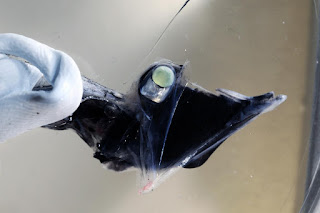
The Tub-eye Fish, Stylephorus chordatus. This species was found to use five different rod opsins within its eyes. The long cylindrical shape of its eyes increases light capture and also enables the fish to move the eyes from a horizontal to a vertical position.
Credit: Dr. Wen-Sung Chung, University of Queensland, Australia
ecology
Antarctic biodiversity hotspots exist wherever penguins and seals poop
Dexterous herring gulls learn new tricks to adapt their feeding habits
environment
Traces of Roman-era pollution stored in the ice of Mont Blanc
bio-inspired
New brain tumor imaging technique uses protein found in scorpion venom
Scientists discover a new class of single-atom nanozymes
These are single-atom catalytic sites inspired by enzyme active sites, apparently.
humans
Abrupt climate change drove early South American population decline
Ancient DNA suggests that some Northern Europeans got their languages from Siberia
"Most Europeans descend from a combination of European hunter-gatherers, Anatolian early farmers, and Steppe herders. But only European speakers of Uralic languages like Estonian and Finnish also have DNA from ancient Siberians. Now, with the help of ancient DNA samples, researchers reporting in Current Biology on May 9 suggest that these languages may have arrived from Siberia by the beginning of the Iron Age, about 2,500 years ago, rather than evolving in Northern Europe."
Virtual Reality can improve quality of life for people with dementia
Appendix removal associated with development of Parkinson's disease
The art of the circus
"From tightrope to trapeze, circus arts have long fascinated and inspired people of all ages. Now, research from the University of South Australia is revealing the true value of circus skills and their unique ability to deliver significant mental health benefits for Australian children."
... no mention of unicycling - bit more manageable than tightropes and trapeze ?
evolution
Discovery of the photosensor for yellow-green light-driven photosynthesis in cyanobacteria
"Cyanobacteria, a type of bacteria that performs photosynthesis, utilize a photosensor to maximize their light-harvesting capacity under different light environments. A joint research team led by Toyohashi University of Technology found a new photosensor that regulates yellow-green light-harvesting antenna in cyanobacteria. Further analysis of the cyanobacterial genomes revealed that this photosensor emerged about 2.1 billion years ago or more and evolved through genetic exchange between cyanobacteria."
The bird that came back from the dead
"New research has shown that the last surviving flightless species of bird, a type of rail, in the Indian Ocean had previously gone extinct but rose from the dead thanks to a rare process called 'iterative evolution'."
life on the edge
Remarkable fish see color in deep, dark water

The Tub-eye Fish, Stylephorus chordatus. This species was found to use five different rod opsins within its eyes. The long cylindrical shape of its eyes increases light capture and also enables the fish to move the eyes from a horizontal to a vertical position.
Credit: Dr. Wen-Sung Chung, University of Queensland, Australia
ecology
Antarctic biodiversity hotspots exist wherever penguins and seals poop
Dexterous herring gulls learn new tricks to adapt their feeding habits
environment
Traces of Roman-era pollution stored in the ice of Mont Blanc
bio-inspired
New brain tumor imaging technique uses protein found in scorpion venom
Scientists discover a new class of single-atom nanozymes
These are single-atom catalytic sites inspired by enzyme active sites, apparently.
humans
Abrupt climate change drove early South American population decline
Ancient DNA suggests that some Northern Europeans got their languages from Siberia
"Most Europeans descend from a combination of European hunter-gatherers, Anatolian early farmers, and Steppe herders. But only European speakers of Uralic languages like Estonian and Finnish also have DNA from ancient Siberians. Now, with the help of ancient DNA samples, researchers reporting in Current Biology on May 9 suggest that these languages may have arrived from Siberia by the beginning of the Iron Age, about 2,500 years ago, rather than evolving in Northern Europe."
Virtual Reality can improve quality of life for people with dementia
Appendix removal associated with development of Parkinson's disease
The art of the circus
"From tightrope to trapeze, circus arts have long fascinated and inspired people of all ages. Now, research from the University of South Australia is revealing the true value of circus skills and their unique ability to deliver significant mental health benefits for Australian children."
... no mention of unicycling - bit more manageable than tightropes and trapeze ?
Thursday, May 09, 2019
science news 9.5.2019
Today's selection of science news. Links are normally to press releases on EurekAlert (at the bottom end I may also add a couple of newspaper stories). I include quotes from the summary (using quotation marks) in cases where the title alone doesn't reveal what the story is about. My own thoughts appear without quotation marks, if I have any.
evolution
New Jurassic non-avian theropod dinosaur sheds light on origin of flight in Dinosauria
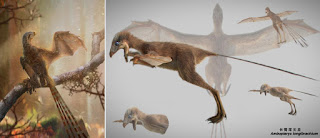
Life reconstruction of the bizarre membranous-winged Ambopteryx longibrachium.
Credit: Chung-Tat Cheung
ecology
Urban trees 'live fast, die young' compared to those in rural forests
Grading conservation: Which reserves defend forests?
anthropocene
Radioactive carbon from nuclear bomb tests found in deep ocean trenches
nanoworld
Creating a global map of the protein shape universe
Researchers create 'impossible' nano-sized protein cages with the help of gold
food & drink
Great chocolate is a complex mix of science, physicists reveal
investigation of the conching process
The smell of dark chocolate, demystified
Understanding the power of honey through its proteins
Avocados, as a substitution for carbohydrates, can suppress hunger without adding calories
Why some red wines taste 'dry'
"Wine connoisseurs can easily discriminate a dry red wine, such as Cabernet Sauvignon, from a fruitier red, like Pinot Noir. Scientists have long linked the 'dryness' sensation in wine to tannins, but how these molecules create their characteristic mouthfeel over time is not fully understood. Now, researchers reporting in ACS' Journal of Agricultural and Food Chemistry have found that tannin structure, concentration and interactions with saliva and other wine components influence the perception of dryness."
humans
Ride-sharing companies make traffic worse instead of better in San Francisco
I suspect that's because their business isn't ride-sharing (as in hitch-hiking), it's unregulated taxi operation.
--------
From the news media:
Phage therapy is in the news and described as if it were a new thing - it has been known for decades, of course, see my 2014 feature.
evolution
New Jurassic non-avian theropod dinosaur sheds light on origin of flight in Dinosauria

Life reconstruction of the bizarre membranous-winged Ambopteryx longibrachium.
Credit: Chung-Tat Cheung
ecology
Urban trees 'live fast, die young' compared to those in rural forests
Grading conservation: Which reserves defend forests?
anthropocene
Radioactive carbon from nuclear bomb tests found in deep ocean trenches
nanoworld
Creating a global map of the protein shape universe
Researchers create 'impossible' nano-sized protein cages with the help of gold
food & drink
Great chocolate is a complex mix of science, physicists reveal
investigation of the conching process
The smell of dark chocolate, demystified
Understanding the power of honey through its proteins
Avocados, as a substitution for carbohydrates, can suppress hunger without adding calories
Why some red wines taste 'dry'
"Wine connoisseurs can easily discriminate a dry red wine, such as Cabernet Sauvignon, from a fruitier red, like Pinot Noir. Scientists have long linked the 'dryness' sensation in wine to tannins, but how these molecules create their characteristic mouthfeel over time is not fully understood. Now, researchers reporting in ACS' Journal of Agricultural and Food Chemistry have found that tannin structure, concentration and interactions with saliva and other wine components influence the perception of dryness."
humans
Ride-sharing companies make traffic worse instead of better in San Francisco
I suspect that's because their business isn't ride-sharing (as in hitch-hiking), it's unregulated taxi operation.
--------
From the news media:
Phage therapy is in the news and described as if it were a new thing - it has been known for decades, of course, see my 2014 feature.
Wednesday, May 08, 2019
science news 8.5.2019
Today's selection of science news. Links are normally to press releases on EurekAlert (at the bottom end I may also add a couple of newspaper stories). I include quotes from the summary (using quotation marks) in cases where the title alone doesn't reveal what the story is about. My own thoughts appear without quotation marks, if I have any.
climate change
Arctic rivers provide fingerprint of carbon release from thawing permafrost
ecology
Lions vs. porcupines
"Lions can bring down wildebeests and giraffes, but when they try to hunt porcupines, the spiky rodents often come out on top. When lions attack porcupines (it's usually young male lions that make that mistake), the porcupine's spines can seriously injure the lion. These injuries can make it impossible for the lions to hunt normally, leading them to hunt livestock or even humans. This study is a deep dive into lion-porcupine interactions over the centuries."!

This is an African porcupine.
Credit: © Eric Kilby
behaviour
Paper wasps capable of behavior that resembles logical reasoning
medical
Groundbreaking study could lead to fast, simple test for Ebola virus
beerology
Mystery of texture of Guinness beer: inclination angle of a pint glass is key to solution
humans
Fewer than half of British men and women have sex at least once a week
The mysterious decline happened 2001-2012 apparently, so we can't even blame it on Brexit ...
climate change
Arctic rivers provide fingerprint of carbon release from thawing permafrost
ecology
Lions vs. porcupines
"Lions can bring down wildebeests and giraffes, but when they try to hunt porcupines, the spiky rodents often come out on top. When lions attack porcupines (it's usually young male lions that make that mistake), the porcupine's spines can seriously injure the lion. These injuries can make it impossible for the lions to hunt normally, leading them to hunt livestock or even humans. This study is a deep dive into lion-porcupine interactions over the centuries."!

This is an African porcupine.
Credit: © Eric Kilby
behaviour
Paper wasps capable of behavior that resembles logical reasoning
medical
Groundbreaking study could lead to fast, simple test for Ebola virus
beerology
Mystery of texture of Guinness beer: inclination angle of a pint glass is key to solution
humans
Fewer than half of British men and women have sex at least once a week
The mysterious decline happened 2001-2012 apparently, so we can't even blame it on Brexit ...
Tuesday, May 07, 2019
science news 7.5.2019
Today's selection of science news. Links are normally to press releases on EurekAlert (at the bottom end I may also add a couple of newspaper stories). I include quotes from the summary (using quotation marks) in cases where the title alone doesn't reveal what the story is about. My own thoughts appear without quotation marks, if I have any.
evolution
The fossilization process of the dinosaur remains
conservation
Even more amphibians are endangered than we thought
"Due to a lack of data on many amphibian species, only about 44% of amphibians have up-to-date assessments on their risk of extinction, compared to nearly 100% of both birds and mammals. Now, researchers reporting May 6 in Current Biology have used known ecological, geographical, and evolutionary attributes of these data-deficient species to model their extinction risk -- and their assessment suggests that at least 1,000 more species are threatened than was previously believed."
NB: The paper in Current Biology appears to be on open access.

Credit: Robert Freckleton
reproduction
Female flies respond to sensation of sex, not just sperm
sustainable technology
Radical desalination approach may disrupt the water industry
"Columbia Engineering researchers report that they have developed a radically different desalination approach--"temperature swing solvent extraction (TSSE)"--for hypersaline brines. Their study demonstrates that TSSE can desalinate very high-salinity brines, up to seven times the concentration of seawater."
humans
Ayahuasca fixings found in 1,000-year-old bundle in the Andes
"archaeologists have discovered traces of the powerfully hallucinogenic potion in a 1,000-year-old leather bundle buried in a cave in the Bolivian Andes."
Origin of Sino-Tibetan language family revealed by new research
evolution
The fossilization process of the dinosaur remains
conservation
Even more amphibians are endangered than we thought
"Due to a lack of data on many amphibian species, only about 44% of amphibians have up-to-date assessments on their risk of extinction, compared to nearly 100% of both birds and mammals. Now, researchers reporting May 6 in Current Biology have used known ecological, geographical, and evolutionary attributes of these data-deficient species to model their extinction risk -- and their assessment suggests that at least 1,000 more species are threatened than was previously believed."
NB: The paper in Current Biology appears to be on open access.

Credit: Robert Freckleton
reproduction
Female flies respond to sensation of sex, not just sperm
sustainable technology
Radical desalination approach may disrupt the water industry
"Columbia Engineering researchers report that they have developed a radically different desalination approach--"temperature swing solvent extraction (TSSE)"--for hypersaline brines. Their study demonstrates that TSSE can desalinate very high-salinity brines, up to seven times the concentration of seawater."
humans
Ayahuasca fixings found in 1,000-year-old bundle in the Andes
"archaeologists have discovered traces of the powerfully hallucinogenic potion in a 1,000-year-old leather bundle buried in a cave in the Bolivian Andes."
Origin of Sino-Tibetan language family revealed by new research
Monday, May 06, 2019
roll back malaria (again)
The global effort to roll back malaria has been a success for a while, but in the last three years, progress in disease reduction appears to have stalled. In my latest feature I am looking at the problems holding back the fight against the disease and at some potential solutions:
Fresh efforts needed against malaria
Current Biology Volume 29, issue 9, pages R301-R303, May 6, 2019
FREE access to full text and PDF download

The mosquito Anopheles gambiae, which transmits malaria in Africa and thereby causes hundreds of thousands of deaths each year, has been called the world’s deadliest animal. (Photo: ArtsyBee/Pixabay.)
Fresh efforts needed against malaria
Current Biology Volume 29, issue 9, pages R301-R303, May 6, 2019
FREE access to full text and PDF download

The mosquito Anopheles gambiae, which transmits malaria in Africa and thereby causes hundreds of thousands of deaths each year, has been called the world’s deadliest animal. (Photo: ArtsyBee/Pixabay.)
Sunday, May 05, 2019
moonlight sonata
All our instruments series, episode 10
Sorry there has been a slight delay in the continuation of this series. This has to do with the instrument I am going to present this week, which has ended up in my care just now, but has been in the family for longer than any other, a bit more than a century.
It is my grandmother's piano, built by August Förster in Leipzig in 1912. My grandmother (Frieda Eberle, née Nagel) was born in 1902, studied at the Conservatoire in Bückeburg, but then married in 1924 and had three daughters. Widowed in 1945, she gave piano and singing lessons at Idar Oberstein until her early death in 1962.
The piano was in storage from 1962 to 1968, but then moved in with us and stayed with my mother until her death. Although she had a somewhat conflicted relationship with the instrument, I think it is safe to say that it has been played at least occasionally for most of its 107-year life time so far.
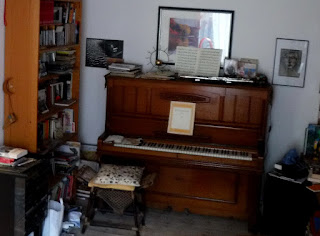
Among my mother's belongings I discovered a 90 min recording of her mother playing piano pieces (and singing an opera duo). As I don't know much about piano sonatas, I'll copy the complete set list in here and would be grateful for any thoughts on the choice of pieces.
Oh, and I put all of it on YouTube as well, so here's a video that doesn't feature my playing for once:
-----------------
Here's the complete list of pieces recorded in January 1958
Beethoven:
Piano Sonata No. 17 in D minor, Op. 31, No. 2, "The Tempest" (audio)
Piano Sonata No. 14 in C♯ minor "Quasi una fantasia", Op. 27, No. 2, popularly known as the Moonlight Sonata (audio)
Piano Sonata No. 8 in C minor, Op. 13, commonly known as Sonata Pathétique (audio)
Mendelssohn
Spinnrocken ???
Frühlingslied
Schubert op 90
Impromptu Nr 2, Nr 3, Nr 4
Mendelssohn
Rondo cappricioso
Brahms
Rhapsodie op 78 (audio from the tail end of the Beethoven sonatas until around here)
Chopin
Rev. Etude
Etude Op 25 Nr 11 (audio of the rest of the piano pieces)
Mozart
duet: Reich mir die Hand mein Leben, from Don Giovanni (audio)
Sorry there has been a slight delay in the continuation of this series. This has to do with the instrument I am going to present this week, which has ended up in my care just now, but has been in the family for longer than any other, a bit more than a century.
It is my grandmother's piano, built by August Förster in Leipzig in 1912. My grandmother (Frieda Eberle, née Nagel) was born in 1902, studied at the Conservatoire in Bückeburg, but then married in 1924 and had three daughters. Widowed in 1945, she gave piano and singing lessons at Idar Oberstein until her early death in 1962.
The piano was in storage from 1962 to 1968, but then moved in with us and stayed with my mother until her death. Although she had a somewhat conflicted relationship with the instrument, I think it is safe to say that it has been played at least occasionally for most of its 107-year life time so far.
Among my mother's belongings I discovered a 90 min recording of her mother playing piano pieces (and singing an opera duo). As I don't know much about piano sonatas, I'll copy the complete set list in here and would be grateful for any thoughts on the choice of pieces.
Oh, and I put all of it on YouTube as well, so here's a video that doesn't feature my playing for once:
-----------------
Here's the complete list of pieces recorded in January 1958
Beethoven:
Piano Sonata No. 17 in D minor, Op. 31, No. 2, "The Tempest" (audio)
Piano Sonata No. 14 in C♯ minor "Quasi una fantasia", Op. 27, No. 2, popularly known as the Moonlight Sonata (audio)
Piano Sonata No. 8 in C minor, Op. 13, commonly known as Sonata Pathétique (audio)
Mendelssohn
Spinnrocken ???
Frühlingslied
Schubert op 90
Impromptu Nr 2, Nr 3, Nr 4
Mendelssohn
Rondo cappricioso
Brahms
Rhapsodie op 78 (audio from the tail end of the Beethoven sonatas until around here)
Chopin
Rev. Etude
Etude Op 25 Nr 11 (audio of the rest of the piano pieces)
Mozart
duet: Reich mir die Hand mein Leben, from Don Giovanni (audio)
Saturday, May 04, 2019
robotic chemistry
Back in February I made a little business trip to the city of London to chat with the CEO of DeepMatter Group, a company founded by the very innovative chemist Lee Cronin whose work I have covered in Chemistry World before. The company aims to bring automation and complete computerised control to general chemical reactions - currently only highly repetitive tasks like peptide synthesis and DNA sequencing are run by robots.
My resulting feature is out now in Chemistry & Industry:
I2 Robot
Chemistry & Industry 83, No. 4, pp 18-21.
access via:
Wiley Online Library (paywalled)
SCI (members only) (should turn up here soon, specific link to follow)
Any access problems give me a shout and I can send a PDF.

After the interview I went to the Tate Modern (Pierre Bonnard exhibition) and also made my way up to their new(ish) viewing platform. (I'm sure architecture watchers can determine the day of my visit from the status of the skyline.)
My resulting feature is out now in Chemistry & Industry:
I2 Robot
Chemistry & Industry 83, No. 4, pp 18-21.
access via:
Wiley Online Library (paywalled)
SCI (members only) (should turn up here soon, specific link to follow)
Any access problems give me a shout and I can send a PDF.
After the interview I went to the Tate Modern (Pierre Bonnard exhibition) and also made my way up to their new(ish) viewing platform. (I'm sure architecture watchers can determine the day of my visit from the status of the skyline.)
Friday, May 03, 2019
science news 3.5.2019
Today's selection of science news. Links are normally to press releases on EurekAlert (at the bottom end I may also add a couple of newspaper stories). I include quotes from the summary (using quotation marks) in cases where the title alone doesn't reveal what the story is about. My own thoughts appear without quotation marks, if I have any.
astrobiology
When it comes to planetary habitability, it's what's inside that counts
evolution
Dwarfs under dinosaur legs: 99-million-year-old millipede discovered in Burmese amber
Running may have made dinosaurs' wings flap before they evolved to fly
Chewing versus sex in the duck-billed dinosaurs
"The duck-billed hadrosaurs walked the Earth over 90-million years ago and were one of the most successful groups of dinosaurs. But why were these 2-3 tonne giants so successful? A new study, published in Paleobiology, shows that their special adaptations in teeth and jaws and in their head crests were crucial, and provides new insights into how these innovations evolved."
Bats evolved diverse skull shapes due to echolocation, diet
ecology
Arsenic-breathing life discovered in the tropical Pacific Ocean
What drives multiple female acorn woodpeckers to share a nest?
Must be the rents ...
Why can't we all get along (like Namibia's pastoralists and wildlife?)
Scientists interviewed pastoralists in Namibia's Namib Desert to see how they felt about conflicts with wildlife, which can include lions and cheetahs preying on livestock and elephants and zebras eating crops.
For giant pandas, bamboo is vegetarian 'meat'

Pandas have a strange mix of have herbivore and carnivore traits.
Credit: Pixabay veverkolog
humans
Why you love coffee and beer
"Why do you swig bitter, dark roast coffee while your coworker guzzles sweet cola? Scientists searched for variations in our taste genes that could explain our beverage preferences, because understanding those preferences could indicate ways to intervene in people's diets. But to scientists' surprise, the study showed taste preferences for bitter or sweet beverages aren't based on variations in our taste genes, but rather genes related to the psychoactive properties of these beverages."
astrobiology
When it comes to planetary habitability, it's what's inside that counts
evolution
Dwarfs under dinosaur legs: 99-million-year-old millipede discovered in Burmese amber
Running may have made dinosaurs' wings flap before they evolved to fly
Chewing versus sex in the duck-billed dinosaurs
"The duck-billed hadrosaurs walked the Earth over 90-million years ago and were one of the most successful groups of dinosaurs. But why were these 2-3 tonne giants so successful? A new study, published in Paleobiology, shows that their special adaptations in teeth and jaws and in their head crests were crucial, and provides new insights into how these innovations evolved."
Bats evolved diverse skull shapes due to echolocation, diet
ecology
Arsenic-breathing life discovered in the tropical Pacific Ocean
What drives multiple female acorn woodpeckers to share a nest?
Must be the rents ...
Why can't we all get along (like Namibia's pastoralists and wildlife?)
Scientists interviewed pastoralists in Namibia's Namib Desert to see how they felt about conflicts with wildlife, which can include lions and cheetahs preying on livestock and elephants and zebras eating crops.
For giant pandas, bamboo is vegetarian 'meat'

Pandas have a strange mix of have herbivore and carnivore traits.
Credit: Pixabay veverkolog
humans
Why you love coffee and beer
"Why do you swig bitter, dark roast coffee while your coworker guzzles sweet cola? Scientists searched for variations in our taste genes that could explain our beverage preferences, because understanding those preferences could indicate ways to intervene in people's diets. But to scientists' surprise, the study showed taste preferences for bitter or sweet beverages aren't based on variations in our taste genes, but rather genes related to the psychoactive properties of these beverages."
Thursday, May 02, 2019
science news 2.5.2019
Today's selection of science news. Links are normally to press releases on EurekAlert (at the bottom end I may also add a couple of newspaper stories). I include quotes from the summary (using quotation marks) in cases where the title alone doesn't reveal what the story is about. My own thoughts appear without quotation marks, if I have any.
astrobiology
ASU researchers find water in samples from asteroid Itokawa
evolution
Flowering plants, new teeth and no dinosaurs: New study sheds light on the rise of mammals
ecology
The hunger gaps: How flowering times affect farmland bees
Hippos, the animal silicon pumps
"The excrements of hippos play an important role in the ecosystem of African lakes and rivers. Because there are fewer and fewer hippos, this ecosystem is in danger. In the long term, this could lead to food shortages at Lake Victoria. These are some of the results of a study by an international team of researchers published in the journal Science Advances."
ooooh, this is another opportunity to reference my Megapoo feature
zoology
Narwhals have endured a million years with low genetic diversity, and they're thriving
Narwhals have also starred in my fantastic species feature and in the one about the impact of arctic shipping.
Why do birds typically live longer than mammals?
"Why do birds typically live longer than mammals? A new paper offers a hint, albeit not a conclusive answer. Assistant Professors of Biology Cynthia Downs and Ana Jimenez at Hamilton College and Colgate University respectively have co-authored a paper with nine students, 'Does cellular metabolism from primary fibroblasts and oxidative stress in blood differ between mammals and birds? The (lack-thereof) scaling of oxidative stress' in press with Integrative and Comparative Biology."
behaviour
Wolves more prosocial than pack dogs in touchscreen experiment
Disturbing news - they'll soon start spreading fake howls on social media ...
humans
Modulating a hormonal pathway improves social function in 2 clinical trials of adults and children with autism spectrum disorder
"Results from two clinical trials reveal that modulating the hormone vasopressin's biological pathway safely enhanced social functioning in 223 adult men and 30 children with autism spectrum disorder (ASD)."
First hominins on the Tibetan Plateau were Denisovans
An actual jaw bone with two teeth represents the first Denisovan found away from the Denisova cave, very exciting discovery.
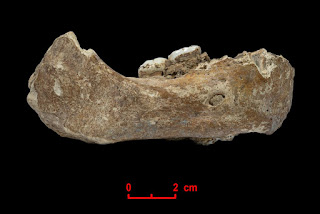
The Xiahe mandible, only represented by its right half, was found in 1980 in Baishiya Karst Cave.
Credit: © Dongju Zhang, Lanzhou University
-------------------
The UK climate report calling for 0 carbon emissions by 2050 discussed in the Guardian.
astrobiology
ASU researchers find water in samples from asteroid Itokawa
evolution
Flowering plants, new teeth and no dinosaurs: New study sheds light on the rise of mammals
ecology
The hunger gaps: How flowering times affect farmland bees
Hippos, the animal silicon pumps
"The excrements of hippos play an important role in the ecosystem of African lakes and rivers. Because there are fewer and fewer hippos, this ecosystem is in danger. In the long term, this could lead to food shortages at Lake Victoria. These are some of the results of a study by an international team of researchers published in the journal Science Advances."
ooooh, this is another opportunity to reference my Megapoo feature
zoology
Narwhals have endured a million years with low genetic diversity, and they're thriving
Narwhals have also starred in my fantastic species feature and in the one about the impact of arctic shipping.
Why do birds typically live longer than mammals?
"Why do birds typically live longer than mammals? A new paper offers a hint, albeit not a conclusive answer. Assistant Professors of Biology Cynthia Downs and Ana Jimenez at Hamilton College and Colgate University respectively have co-authored a paper with nine students, 'Does cellular metabolism from primary fibroblasts and oxidative stress in blood differ between mammals and birds? The (lack-thereof) scaling of oxidative stress' in press with Integrative and Comparative Biology."
behaviour
Wolves more prosocial than pack dogs in touchscreen experiment
Disturbing news - they'll soon start spreading fake howls on social media ...
humans
Modulating a hormonal pathway improves social function in 2 clinical trials of adults and children with autism spectrum disorder
"Results from two clinical trials reveal that modulating the hormone vasopressin's biological pathway safely enhanced social functioning in 223 adult men and 30 children with autism spectrum disorder (ASD)."
First hominins on the Tibetan Plateau were Denisovans
An actual jaw bone with two teeth represents the first Denisovan found away from the Denisova cave, very exciting discovery.

The Xiahe mandible, only represented by its right half, was found in 1980 in Baishiya Karst Cave.
Credit: © Dongju Zhang, Lanzhou University
-------------------
The UK climate report calling for 0 carbon emissions by 2050 discussed in the Guardian.
Subscribe to:
Posts (Atom)


